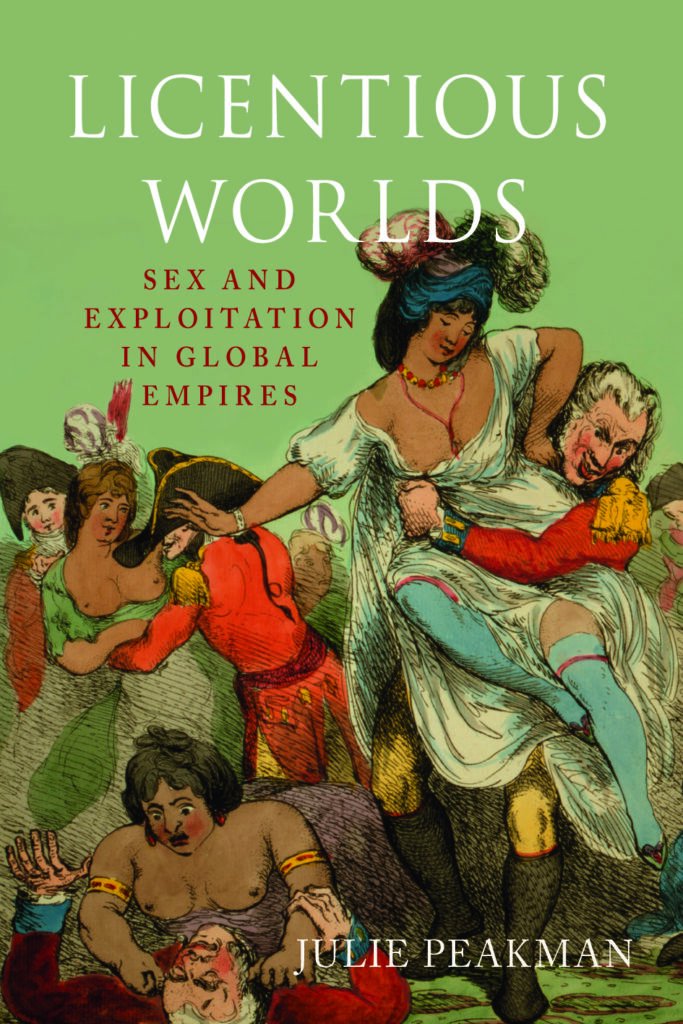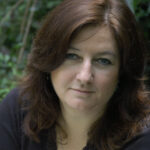Licentious Worlds is a history of sexual attitudes and behaviour through five hundred years of empire-building around the world. It examines colonization and the imperial experience putting women back in the picture, showing their role in the building of empires and how marginalized women and men were almost invariably exploited. Women acted as negotiators, brothel-keepers, traders and peacekeepers, but they were also oppressed, forced into marriages and raped. The book describes daily life in Turkish harems, Mughal zenanas and Japanese geisha houses, as well as in royal palaces, private households and on board ships.

Notches: What drew you to this topic, and what questions do you still have?
Julie Peakman: I have been researching the history of sexuality for nearly 30 years and noticed that no-one had attempted a world history of sexuality. I wanted to trace the change which occurred during so-called ‘civilization’ of the world – which actually was one of the most barbaric periods.
I have lots of questions. I will die asking questions.
Notches: This book is about the history of sex and sexuality, but what other themes does it speak to?
JP: It covers the history of misogyny, homophobia, and racism and covers the general persecution of women, homosexuals, indigenous people, and minorities. It speaks of greed and power and shows how the world was run by avaricious men – not much changed there then….
Notches: How did you research the book? What sources did you use and were there any especially exciting discoveries or any particular challenges?
I travelled all over the world collecting information. The stories are drawn from many sources – from captains’ logs, missionary reports, and cannibals’ memoirs to travellers’ letters, traders’ accounts, and reports on prostitution. From debauched clerics and hog-sodomizing Pilgrims to sexually fluid cannibals and homosexual samurai. I liked to take history where it has never been before. I was particularly excited about finding Maretu’s memoirs in the South Pacific, an indigenous man from Rarotonga in nineteenth-century Cook Islands; also in the main library in Suva, Fiji, I found a diary of a nineteenth-century Polish traveller along with missionaries wives’ diaries and letters.
Notches: Whose stories or what topics were left out of your book and why? What would you include had you been able to?
Peakman: While I tried to find the voices of indigenous people, they were often silenced, mainly because they often had oral traditions or could not write. It would have been good to have their voices and some knowledge of what they were feeling at the time.
Notches: Did the book shift significantly from the time you first conceptualized it?
JP: I don’t really conceptualise and make plans for books. I start out with a rough idea of what I would like to uncover and go in search. My books are fairly organic and are fashioned by the material itself. You can usually spot those authors who have thought up a theory and squash all their information in to make it fit.
Notches: How did you become interested in the history of sexuality?
JP: From the time I knew I was a woman. I knew all the sexism was down to men making all the rules. I was a true teenager of the 70s, a time when women were deciding to do their own thing rather than what they were told by men. Luckily, the place where I was brought up (Wigan) had a lot of liberated men, and one of the first Northern gay clubs.
Notches: How do you see your book being most effectively used in the classroom? What would you assign it with?
JP: To educate people, especially young people, to see the world through different eyes; to see how misogyny, racism, and power has dictated the way life has been built now, and how it needs to change. The future must change fundamentally. Why does this history matter today? Because for too long, certain powerful men have ruled the world. It’s time to give the rest of us a go. It is taking too long and we need to be less patient and more demanding of change. Change for equality, for more women in Parliaments, to stop child marriage of young girls and female genital mutilation; to save the natural world, rather than burn it down and pollute it. Any world which allows billionaires to exist is a sick one (unless they hand it over to charity…..I like what Bill and Melinda Gates are doing).
Notches: Your book is published, what next?
JP: A book about eighteenth-century London sexual culture, working title, Love and Lusts in London, due from Reaktion, 2022.
 Dr. Julie Peakman is a historian in eighteenth-century culture and an expert in the history of sexuality and erotica. She is Fellow of the Royal Historical Society and Honorary Fellow at Birkbeck College, University of London. She is a frequent contributor to journals, magazines and television documentaries for BBC, Channel 4, and the Biography Channel. Her books include Licentious Worlds: Sex & Exploitation in Global Empires (2019); Amatory Pleasures: Exploration in Eighteenth-Century Sexual Culture (2016); The Pleasure’s All Mine. A History of Perverse Sex (2013); Lascivious Bodies: A Sexual History of the Eighteenth Century (2004) and Mighty Lewd Books: The Development of Pornography in Eighteenth-Century England (2003). She has also edited six Volumes of A Cultural History of Sexuality (2011); Sexual Perversions 1670-1890 (2009); and eight Volumes of Whores Biographies, 1700-1825 (2006-7). She is also biographer of Peg Plunkett, Memoirs of a Whore (2014) and Emma Hamilton (2005).
Dr. Julie Peakman is a historian in eighteenth-century culture and an expert in the history of sexuality and erotica. She is Fellow of the Royal Historical Society and Honorary Fellow at Birkbeck College, University of London. She is a frequent contributor to journals, magazines and television documentaries for BBC, Channel 4, and the Biography Channel. Her books include Licentious Worlds: Sex & Exploitation in Global Empires (2019); Amatory Pleasures: Exploration in Eighteenth-Century Sexual Culture (2016); The Pleasure’s All Mine. A History of Perverse Sex (2013); Lascivious Bodies: A Sexual History of the Eighteenth Century (2004) and Mighty Lewd Books: The Development of Pornography in Eighteenth-Century England (2003). She has also edited six Volumes of A Cultural History of Sexuality (2011); Sexual Perversions 1670-1890 (2009); and eight Volumes of Whores Biographies, 1700-1825 (2006-7). She is also biographer of Peg Plunkett, Memoirs of a Whore (2014) and Emma Hamilton (2005).

NOTCHES: (re)marks on the history of sexuality is licensed under a Creative Commons Attribution-NonCommercial-NoDerivatives 4.0 International License.
Based on a work at www.notchesblog.com.
For permission to publish any NOTCHES post in whole or in part please contact the editors at NotchesBlog@gmail.com




